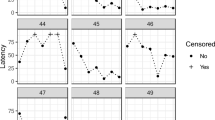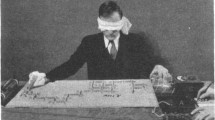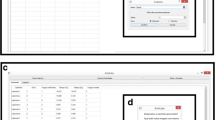Abstract
Sixty fourth-grade children were given two different series of the Porteus Maze Test. The first series was given as a baseline, and the second series was administered under one of four different experimental conditions: control, response cost, positive reinforcement, or negative verbal feedback. Response cost and positive reinforcement, but not negative verbal feedback, led to significant decreases in the number of all types of qualitative errors in relation to the control group. The reduction of nontargeted as well as targeted errors provides evidence for the generalized effects of response cost and positive reinforcement.
Similar content being viewed by others
References
Bena, T. (1980).Response cost and impulsive word recognition errors in reading disabled and normal children. Unpublished honors thesis, University of Iowa.
Brent, D. E., & Routh, D. K. (1978). Response cost and impulsive word recognition errors in reading-disabled children.Journal of Abnormal Child Psychology, 6, 211–219.
Burchard, J. D., & Barrera, F. (1972). An analysis of timeout and response cost in a programmed environment.Journal of Applied Behavior Analysis, 5, 271–282.
Buss, A. H., Braden, W., Orgel, A., & Buss, E. H. (1956). Acquisition and extinction with different verbal reinforcement combinations.Journal of Experimental Psychology, 52, 288–295.
Buss, A. H., & Buss, E. H. (1956). The effect of verbal reinforcement combinations on conceptual learning.Journal of Experimental Psychology, 52, 283–287.
Docter, R. F., & Winder, C. L. (1954). Delinquent vs. nondelinquent performance on the Porteus Qualitative Maze Test.Journal of Consulting and Clinical Psychology, 18, 71–73.
Errickson, E. A., Wyne, M. D., & Routh, D. K. (1973). A response-cost procedure for reduction of impulsive behavior of academically handicapped children.Journal of Abnormal Child Psychology, 1, 350–357.
Fooks, G., & Thomas, R. R. (1957). Differential qualitative performance of delinquents on the Porteus Maze.Journal of Consulting and Clinical Psychology, 21, 351–353.
Foulds, G. A. (1951). Temperamental differences in Maze performance.British Journal of Psychology, 42, 209–217.
Hollingshead, A. B. (1957).Two factor index of social position. Unpublished manuscript, 1965. Yale Station, New Haven, Connecticut.
Iwata, B. A., & Bailey, J. S. (1974). Reward versus cost token systems: An analysis of the effects on students and teacher.Journal of Applied Behavior Analysis, 7, 567–576.
Kaufman, K. F., & O'Leary, K. D. (1972). Reward, cost, and self-evaluation procedures for disruptive adolescents in a psychiatric hospital school.Journal of Applied Behavior Analysis, 5, 293–309.
Levine, M., Leitenberg, H., & Richter, M. (1964). The blank trials law: The equivalence of positive reinforcement and nonreinforcement.Psychological Review, 71, 94–103.
Matson, J. L., & DiLorenzo, T. M. (1984).Punishment and its alternatives: A new perspective for behavior modification. New York: Springer.
Meichenbaum, D. H., & Goodman, J. (1971). Training impulsive children to talk to themselves: A means of developing self-control.Journal of Abnormal Psychology, 77, 115–126.
Nelson, W. M., III, Finch, A. J., Jr., & Hooke, J. F. (1975). Effects of reinforcement and response-cost on cognitive style in emotionally disturbed boys.Journal of Abnormal Psychology, 84, 426–428.
Palkes, H., Stewart, M., & Freedman, J. (1971). Improvement in Porteus Maze performance of hyperactive boys as a function of verbal-training procedures.Journal of Special Education, 5, 337–342.
Palkes, H., Stewart, M., & Kahana, B. (1968). Porteus Maze performance of hyperactive boys after training in self-directed verbal commands.Child Development, 39, 817–826.
Porteus, S. D. (1942).Qualitative performance in the Maze Test. Vineland, New Jersey: Smith.
Porteus, S. D. (1959).The Maze Test and clinical psychology. Palo Alto, California: Pacific Books.
Porteus, S. D. (1965).Porteus Maze Tests: Fifty years application. Palo Alto, California: Pacific Books.
Riddle, M., & Roberts, A. H. (1977). Delinquency, delay of gratification, recidivism, and the Porteus Maze Tests.Psychological Bulletin, 84, 417–425.
Sanderson, M. (1945). Performance of fifth, eighth, and eleventh grade children in the Porteus Maze Qualitative Maze Tests.Journal of Genetic Psychology, 67, 57–65.
Schalling, D., & Rosen, A. S. (1968). Porteus Maze differences between psychopathic and nonpsychopathic criminals.British Journal of Social and Clinical Psychology, 7, 224–228.
Sutker, P. B., Moan, C. E., & Swanson, W. C. (1972). Porteus Maze Test qualitative performance in pure sociopaths, prison normals and antisocial psychotics.Journal of Clinical Psychology, 28, 349–353.
Weiner, H. (1962). Some effects of response cost upon human operant behavior.Journal of the Experimental Analysis of Behavior, 5, 201–208.
Weiner, H. (1963). Response cost and the aversive control of human operant behavior.Journal of Experimental Analysis of Behavior, 6, 415–421.
Wright, C. (1944). The qualitative performance of delinquent boys on the Porteus Maze Test.Journal of Consulting and Clinical Psychology, 8, 24–26.
Author information
Authors and Affiliations
Rights and permissions
About this article
Cite this article
Neenan, D.M., Routh, D.K. Response cost, reinforcement, and children's porteus maze qualitative performance. J Abnorm Child Psychol 14, 469–480 (1986). https://doi.org/10.1007/BF00915439
Revised:
Issue Date:
DOI: https://doi.org/10.1007/BF00915439




